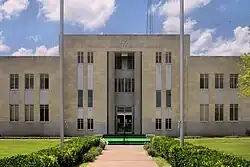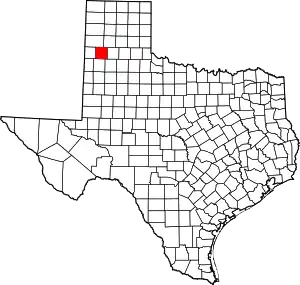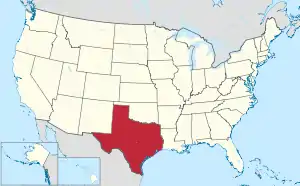Castro County | |
|---|---|
 Castro County Courthouse in Dimmitt | |
 Location within the U.S. state of Texas | |
 Texas's location within the U.S. | |
| Coordinates: 34°32′N 102°16′W / 34.53°N 102.26°W | |
| Country | |
| State | |
| Founded | 1891 |
| Named for | Henri Castro |
| Seat | Dimmitt |
| Largest city | Dimmitt |
| Area | |
| • Total | 899 sq mi (2,330 km2) |
| • Land | 894 sq mi (2,320 km2) |
| • Water | 4.9 sq mi (13 km2) 0.5% |
| Population (2020) | |
| • Total | 7,371 |
| • Density | 8.2/sq mi (3.2/km2) |
| Time zone | UTC−6 (Central) |
| • Summer (DST) | UTC−5 (CDT) |
| Congressional district | 19th |
| Website | www |
Castro County is a county located in the U.S. state of Texas. As of the 2020 census, its population was 7,371.[1][2] Its county seat is Dimmitt.[3] The county was named for Henri Castro,[4] who was consul general to France for the Republic of Texas and the founder of a colony in Texas.
The county was created in 1876 and was organized in 1891.[5]
On 10 April 2023, an explosion and subsequent fire at South Fork Dairy, about 10 miles south of Dimmitt, resulted in the deaths of an estimated 18,000 dairy cattle.[6]
Geography
According to the U.S. Census Bureau, the county has a total area of 899 square miles (2,330 km2), of which 4.9 square miles (13 km2) (0.5%) are covered by water.[7]
Major highways
Adjacent counties
- Deaf Smith County (north)
- Randall County (northeast)
- Swisher County (east)
- Hale County (southeast)
- Lamb County (south)
- Parmer County (west)
Demographics
| Census | Pop. | Note | %± |
|---|---|---|---|
| 1890 | 9 | — | |
| 1900 | 400 | 4,344.4% | |
| 1910 | 1,850 | 362.5% | |
| 1920 | 1,948 | 5.3% | |
| 1930 | 4,720 | 142.3% | |
| 1940 | 4,631 | −1.9% | |
| 1950 | 5,417 | 17.0% | |
| 1960 | 8,923 | 64.7% | |
| 1970 | 10,394 | 16.5% | |
| 1980 | 10,556 | 1.6% | |
| 1990 | 9,070 | −14.1% | |
| 2000 | 8,285 | −8.7% | |
| 2010 | 8,062 | −2.7% | |
| 2020 | 7,371 | −8.6% | |
| U.S. Decennial Census[8] 1850–2010[9] 2010[10] 2020[11] | |||
| Race / Ethnicity | Pop 2010[10] | Pop 2020[11] | % 2010 | % 2020 |
|---|---|---|---|---|
| White alone (NH) | 3,004 | 2,328 | 37.26% | 31.58% |
| Black or African American alone (NH) | 149 | 95 | 1.85% | 1.29% |
| Native American or Alaska Native alone (NH) | 29 | 39 | 0.36% | 0.53% |
| Asian alone (NH) | 30 | 22 | 0.37% | 0.30% |
| Pacific Islander alone (NH) | 0 | 4 | 0.00% | 0.05% |
| Some other race alone (NH) | 5 | 9 | 0.06% | 0.12% |
| Mixed race/multiracial (NH) | 17 | 90 | 0.21% | 1.22% |
| Hispanic or Latino (any race) | 4,828 | 4,784 | 59.89% | 64.90% |
| Total | 8,062 | 7,371 | 100.00% | 100.00% |
Note: the US Census treats Hispanic/Latino as an ethnic category. This table excludes Latinos from the racial categories and assigns them to a separate category. Hispanics/Latinos can be of any race.

As of the census[12] of 2000, 8,285 people, 2,761 households, and 2,159 families were residing in the county. The population density was 9 people per square mile (3.5 people/km2). The 3,198 housing units averaged 4 units per square mile (1.5/km2). The racial makeup of the county was 75.35% White, 2.27% African American, 1.17% Native American, 19.15% from other races, and 2.05% from two or more races. About 51.65% of the population were Hispanic or Latino of any race.
Of the 2,761 households, 40.90% had children under 18 living with them, 65.10% were married couples living together, 8.70% had a female householder with no husband present, and 21.80% were not families. About 20.50% of all households were made up of individuals, and 10.20% had someone living alone who was 65 or older. The average household size was 2.98, and the average family size was 3.45.
In the county, the age distribution was 33.10% under 18, 9.00% from 18 to 24, 24.30% from 25 to 44, 20.90% from 45 to 64, and 12.70% who were 65 or older. The median age was 32 years. For every 100 females, there were 100.50 males. For every 100 females aged 18 and over, there were 98.20 males.
The median income for a household in the county was $30,619, and for a family was $35,422. Males had a median income of $25,379 versus $20,433 for females. The per capita income for the county was $14,457. About 15.70% of families and 19.00% of the population were below the poverty line, including 25.30% of those under age 18 and 13.90% of those age 65 or over.
Politics
| Year | Republican | Democratic | Third party | |||
|---|---|---|---|---|---|---|
| No. | % | No. | % | No. | % | |
| 2020 | 1,602 | 76.91% | 466 | 22.37% | 15 | 0.72% |
| 2016 | 1,414 | 70.81% | 526 | 26.34% | 57 | 2.85% |
| 2012 | 1,470 | 69.37% | 630 | 29.73% | 19 | 0.90% |
| 2008 | 1,562 | 68.18% | 719 | 31.38% | 10 | 0.44% |
| 2004 | 1,794 | 73.83% | 631 | 25.97% | 5 | 0.21% |
| 2000 | 1,607 | 68.27% | 727 | 30.88% | 20 | 0.85% |
| 1996 | 1,231 | 49.22% | 1,107 | 44.26% | 163 | 6.52% |
| 1992 | 1,307 | 44.91% | 1,113 | 38.25% | 490 | 16.84% |
| 1988 | 1,604 | 52.61% | 1,436 | 47.10% | 9 | 0.30% |
| 1984 | 2,026 | 66.30% | 1,009 | 33.02% | 21 | 0.69% |
| 1980 | 1,955 | 60.75% | 1,199 | 37.26% | 64 | 1.99% |
| 1976 | 1,007 | 32.74% | 2,033 | 66.09% | 36 | 1.17% |
| 1972 | 1,685 | 68.75% | 751 | 30.64% | 15 | 0.61% |
| 1968 | 1,033 | 36.40% | 1,181 | 41.61% | 624 | 21.99% |
| 1964 | 626 | 25.10% | 1,865 | 74.78% | 3 | 0.12% |
| 1960 | 810 | 34.01% | 1,544 | 64.82% | 28 | 1.18% |
| 1956 | 697 | 34.75% | 1,305 | 65.05% | 4 | 0.20% |
| 1952 | 1,169 | 58.57% | 825 | 41.33% | 2 | 0.10% |
| 1948 | 189 | 13.76% | 1,158 | 84.28% | 27 | 1.97% |
| 1944 | 222 | 18.45% | 838 | 69.66% | 143 | 11.89% |
| 1940 | 224 | 18.27% | 1,000 | 81.57% | 2 | 0.16% |
| 1936 | 65 | 6.34% | 950 | 92.68% | 10 | 0.98% |
| 1932 | 66 | 6.45% | 949 | 92.77% | 8 | 0.78% |
| 1928 | 319 | 45.38% | 384 | 54.62% | 0 | 0.00% |
| 1924 | 68 | 18.43% | 219 | 59.35% | 82 | 22.22% |
| 1920 | 118 | 41.84% | 158 | 56.03% | 6 | 2.13% |
| 1916 | 69 | 27.38% | 176 | 69.84% | 7 | 2.78% |
| 1912 | 18 | 8.65% | 171 | 82.21% | 19 | 9.13% |
Communities

Cities
Unincorporated communities
Education
School districts:[14]
- Dimmitt Independent School District
- Happy Independent School District
- Hart Independent School District
- Hereford Independent School District
- Lazbuddie Independent School District
- Nazareth Independent School District
- Springlake-Earth Independent School District
All of the county is in the service area of Amarillo College.[15]
See also
References
- ↑ "U.S. Census Bureau QuickFacts: Castro County, Texas". United States Census Bureau. Retrieved January 31, 2022.
- ↑ "Castro County, Texas". United States Census Bureau. Retrieved February 23, 2021.
- ↑ "Find a County". National Association of Counties. Archived from the original on May 31, 2011. Retrieved June 7, 2011.
- ↑ Gannett, Henry (1905). The Origin of Certain Place Names in the United States. Govt. Print. Off. pp. 72.
- ↑ "Texas: Individual County Chronologies". Texas Atlas of Historical County Boundaries. The Newberry Library. 2008. Archived from the original on August 9, 2016. Retrieved May 21, 2015.
- ↑ Rick Jervis (January 3, 2024). "Cloud still hangs over Texas dairy disaster". USA Today.
- ↑ "2010 Census Gazetteer Files". United States Census Bureau. August 22, 2012. Retrieved April 20, 2015.
- ↑ "Decennial Census of Population and Housing by Decade". US Census Bureau.
- ↑ "Texas Almanac: Population History of Counties from 1850–2010" (PDF). Texas Almanac. Archived (PDF) from the original on October 9, 2022. Retrieved April 20, 2015.
- 1 2 "P2 HISPANIC OR LATINO, AND NOT HISPANIC OR LATINO BY RACE - 2010: DEC Redistricting Data (PL 94-171) - Castro County, Texas". United States Census Bureau.
- 1 2 "P2 HISPANIC OR LATINO, AND NOT HISPANIC OR LATINO BY RACE - 2020: DEC Redistricting Data (PL 94-171) - Castro County, Texas". United States Census Bureau.
- ↑ "U.S. Census website". United States Census Bureau. Retrieved May 14, 2011.
- ↑ Leip, David. "Dave Leip's Atlas of U.S. Presidential Elections". uselectionatlas.org. Retrieved July 20, 2018.
- ↑ "2020 CENSUS - SCHOOL DISTRICT REFERENCE MAP: Castro County, TX" (PDF). U.S. Census Bureau. Archived (PDF) from the original on October 9, 2022. Retrieved June 29, 2022. - list
- ↑ Texas Education Code, Sec. 130.164. AMARILLO COLLEGE DISTRICT SERVICE AREA..